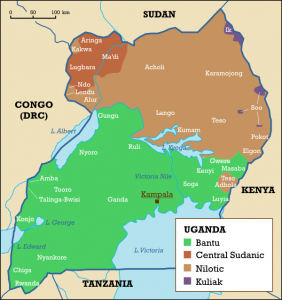Kampala is the capital city of Uganda and is located in the South-east of the country just north of Lake Victoria. In the late 1800s, the United Kingdom began to control Uganda as a colony. Uganda gained it’s independence from the United Kingdom on October 6, 1962. Since independence Uganda has gone through several stages of political unrest. The dictatorial regime of Idi Amin lasted from 1971 to 1979 and the regime of Milton Obote lasted from 1980-1985. Since 1986 Uganda has been governed by President Yoweri Museveni.
 As a result of the boundaries created during colonial rule, Uganda is home to more than 30 different ethnic groups. Some of these groups are also divided by the borders into neighboring countries. English and Swahili are considered the national languages of Uganda and most Ugandan people speak another regional language as well. Due to its position as the capital many different languages are spoken in Kampala.
As a result of the boundaries created during colonial rule, Uganda is home to more than 30 different ethnic groups. Some of these groups are also divided by the borders into neighboring countries. English and Swahili are considered the national languages of Uganda and most Ugandan people speak another regional language as well. Due to its position as the capital many different languages are spoken in Kampala.
In addition to language, each cultural group in Uganda has unique musical traditions that have evolved over time. In Kampala these diverse musical styles blend together with influences form the British colonial period and more recent influences to form distinct musical styles. Some of the recent influences include reggae, dancehall and hip-hop. Kidandali and Kadongo Kamu are two of the musical styles to emerge from Uganda as a result of this fusion of styles.
The goal of this field study is to investigate the influences of traditional music, British colonial music and other ‘western’ influences on the contemporary music of Kampala, Uganda.
In the mid twentieth century, a German ethnomusicologist, Klaus Wachsmann, made a substantial number of field recordings and published several works on the traditional music of Uganda. I plan to further explore the work he did as well as the work of contemporary Ugandan ethnomusicologists such as Sylvia Nannyonga-Tamusuza at Makerere University.
Additionally, I plan to work with a primary and secondary school teacher at the international school in Kampala. This will give me the opportunity to learn more about the music of Uganda as well as glimpse some of the ways music is taught. I also plan to attend music and dance performances and interview the performers about their experiences creating and performing music in Uganda.
Research Questions:
- How do contemporary Ugandan artists view/perceive the influence of British colonialism on their music?
- How do the instruments/timbres from traditional Ugandan music combine with other influences in contemporary Ugandan music?
- How are traditional rhythms incorporated into contemporary Ugandan music?
Research Methods:
- Interviews
- Review of literature
- Performances
- Audio and Video Recordings
- Working with music teacher at International School
- Listening
Research Outcomes:
- Ethnographic report with audio and visual components